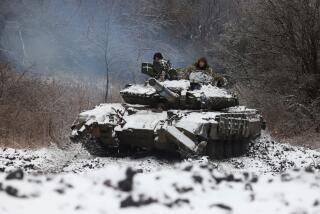Double Standard, Lots of Blame
- Share via
What was it that Russia could have learned from the West’s recent intervention in Yugoslavia? Or, put differently, what was it that the West wanted Russia to learn from its resistance to brutalities of Slobodan Milosevic’s regime in Kosovo?
To many Western politicians, the answer is obvious: Russia, as well as other parts of the globe, should have gotten the message that from now on, no one would be allowed to grossly violate human rights.
What Russia has learned from the NATO campaign in Yugoslavia is something very different, however. Russia has learned that the West, led by the U.S., will do everything possible to establish its global hegemony and that, in attempting to accomplish this goal, it will continue to appeal to the rhetoric of human rights.
Why such a gap in perceptions? In part, the gap has to so with semi-authoritarian nature of Russia’s new political regime, in which the military recently has gained an upper hand in the country’s decision-making process. Russia’s heavy-handed approach to Chechnya’s separatism is a case in point. Russia’s recent ultimatum to Grozny and its readiness to level the city to the ground demonstrate that military authorities, supported by the former KGB officer and now acting President Vladimir V. Putin, are committed to eliminating the threat of terrorism at any cost.
Yet the other part of the story has to do with the West’s double standard in handling the affairs in Eurasia and beyond. In Russia, the argument about the West’s hypocritical stand is well known and embraced wholeheartedly. An average Russian might tell you how Moscow initiated the peaceful end of the Cold War and in exchange--in the name of market democracy and human rights protection--got mass robbery and a catastrophic decline in living standards, the NATO expansion and the airstrikes in Yugoslavia. Politicians might explain how Russia was made to accept the humiliating status of the West’s junior partner. In today’s Russia, the West is routinely blamed for the shock-therapy approach in economic reform, the orientation of the ex-Soviet republics away from the former Soviet region, and now for the inability of the Kremlin to finish off the Chechen terrorists once and forever.
An exaggeration? Of course. Yet the truth of the matter is that the West is to blame for what’s happening in Russia and Chechnya. It is not just Russia that mishandled Chechnya. Chechnya’s problem is a local symptom of a global failure--a failure of cooperation between Russia and the West. Instead of nurturing grass-roots movements and democratic process, the West preferred to deal with former nomenklatura leaders--first and foremost Boris N. Yeltsin--and supported them even when they ordered a military storm of the national Parliament in 1993 and launched a bloody war against Chechnya in 1994.
After all that, it is difficult to believe in the West’s good intentions or to take seriously President Clinton’s warning that Russia would “pay a heavy price” for its continued brutal assault on Chechen civilians.
It is illogical to believe that in 1994-1996 Clinton was not yet aware of what was happening in Russia and, therefore, could not stand firm against human rights violations. It makes more sense to speculate that it is only now, after the NATO’s “victorious” mission in Yugoslavia, that the West and the U.S. found it convenient to start detaching themselves from Russia and pushing it against the wall for what it has been doing all these years. This is politics, and in politics that’s called a “double standard.”
The truth of the matter is that, so far, the West has been wasting its moral credibility in the eyes of Russians, not using it for truly engaging Russia in the global society of nations.
What to do now? Can Russia’s relationship with the West be repaired? There is no obvious answer. The thaw of Mikhail S. Gorbachev’s era cannot be returned. The West had better start designing a long-overdue strategy of cooperative relations with the Eurasian giant. “Junior partnership” will no longer work.
This time, it must be a strategy of Russia’s global engagement that is morally consistent and free of double standards.
More to Read
Sign up for Essential California
The most important California stories and recommendations in your inbox every morning.
You may occasionally receive promotional content from the Los Angeles Times.












